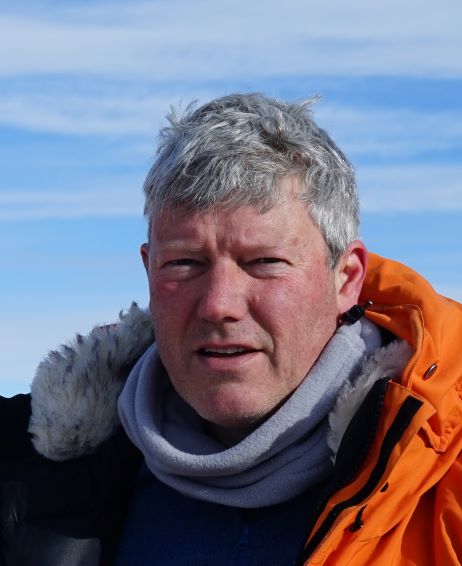2021 Thomson Medal: Leadership for New Zealand Antarctic research

Professor Gary Wilson has been awarded the Thomson Medal by Royal Society Te Apārangi for his leadership in developing New Zealand's international profile in Antarctic Research.
The Thomson Medal is awarded for outstanding contributions to the organisation, support, and application of science, technology and the humanities.
Gary is currently Chief Scientist and General Manager Research, Strategy and Partnerships at GNS Science.
Through his roles as Director of the New Zealand Antarctic Research Institute, Chief Scientific Advisor at Antarctica New Zealand and New Zealand Delegate to the Scientific Committee on Antarctic Research, Gary has provided important and strategic leadership for the New Zealand Antarctic Research Programme. These programmes supported more than 100 New Zealand researchers and research students to conduct research in many frontier areas and present their findings at the highest international level. Through representation at international fora, Gary helped develop high profile collaborations with Antarctic programmes in South Korea, Italy, Germany, Chile, Australia, South Africa and China.
Since his return to New Zealand in 2002, Gary has taken on a number of high profile and valuable leadership roles that have enabled and supported New Zealand's world-leading position in Antarctic research as evidenced by high quality international research partnerships, New Zealand's standing in the Scientific Committee in Antarctic Research and the Antarctic Treaty System. The majority of Gary's leadership contribution has been voluntary.
Between 2002 and 2010, Gary led the international science and implementation committee for the high profile $40million ANDRILL project consortium, funded through the national funding agencies of USA, Italy, Germany and New Zealand.
Between 2012 and 2017, Gary was the inaugural director of the New Zealand Antarctic Research Institute (NZARI) - a public-private partnership that provided more than $7 million in grants from philanthropists and industry for New Zealand Antarctic researchers. NZARI built a strategic direction for New Zealand's Antarctic research that was focused on significant global challenges where Antarctica was the key - such as climate change, ice sheet loss, loss of biodiversity and marine protection. The vision was built around a community workshop with more than 100 representatives from across the New Zealand Antarctic research programme and it received broad engagement through regular interest from New Zealand media and Air New Zealand through its sustainability initiatives. The broad science directions from NZARI – such as investigating the role of the Ross Ice Shelf in loss of the Antarctic ice and understanding the impact of changing climates on ecosystems – have been further developed by the new Antarctic Science Platform.
Between 2015 and 2017, Gary also served as Antarctica New Zealand's Chief Scientific Advisor pro bono. In that role, Gary was able to extend the reach of the New Zealand Antarctic research programme to support remote field operations supported by up to 1,000 km traverses across the Ross Ice Shelf and remotely-based helicopter camps up to 700 km north as far as Cape Adare. These major expeditions changed the paradigm from ‘conducting research where we could reach’ to ‘extending the reach to where we need to conduct research to address global challenges’. NZARI's programme funding resulted in more than 50 publications in international journals during Gary's tenure. Gary also represented New Zealand at the Antarctic Treaty meetings.
In 2016, Gary took on the role of Chair of the New Zealand National Committee on Antarctic Sciences and the New Zealand Delegate to the Scientific Committee on Antarctic Research (SCAR) and since 2018 he has served as Vice President of SCAR. Through the Committee, Gary has helped lead the science contribution to the redevelopment plan for Scott Base and build a more vibrant NZ Antarctic Science Conference.
On receiving this award Gary said: “It is very humbling to be awarded the Thomson Medal by the Royal Society Te Apārangi. Working in Antarctica can be very challenging and always requires large teams of researchers and support staff. But it has always been a pleasure working with so many dedicated and passionate people. They are the real recipients of this award.
“Understanding how Antarctica and the Southern Oceans will respond as the planet warms is now more important than ever. Ensuring humanity’s response to the current climate and biodiversity challenges results in significant, rapid and real change is vital if we are to avoid the worst impacts on our society and economy.
“I’d like to dedicate this award to the late Sir Rob Fenwick whose vision and foresight helped lift the level of New Zealand’s scientific research effort in Antarctica over the past decade and also to my family who have supported me to spend more than four years of my life in Antarctica over the past thirty-years.”
A paleoclimatologist, his personal research is focused on determining Antarctica’s role in the global ocean and climate system and he has a large number of publications in top peer-reviewed journals. Gary is also an Honorary Professor at the University of Otago, joining the Geology Department at the University as a lecturer in 2002 and was Associate Dean for Research (Sciences) from 2006-2009 and head of department for Marine Sciences from 2009-2013.
Award:
The Thomson Medal is awarded annually for outstanding contributions to the organisation, support, and application of science, technology and the humanities.
Citation:
To Gary Steven Wilson for leadership in developing New Zealand’s international profile in Antarctic research.
